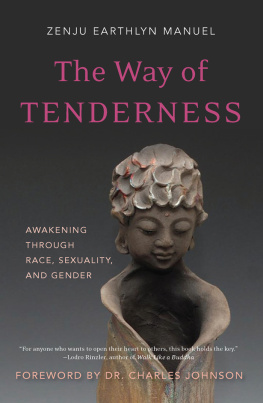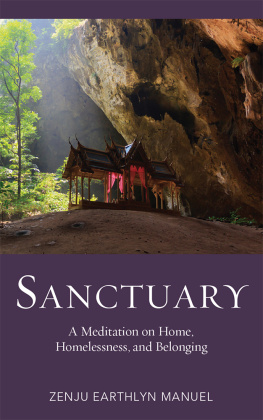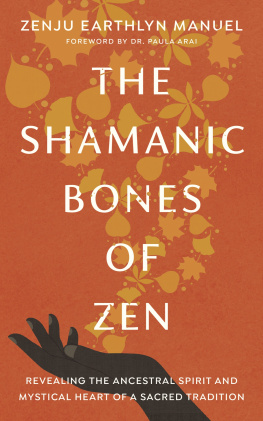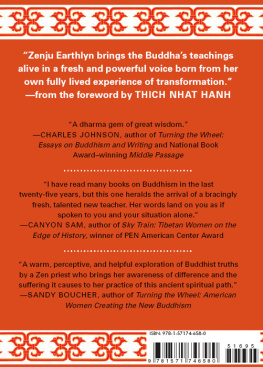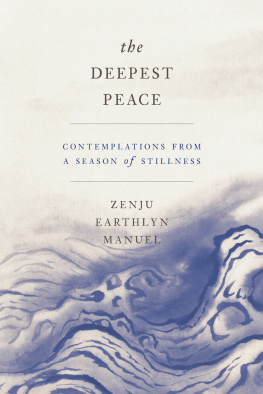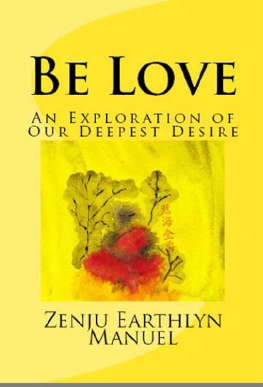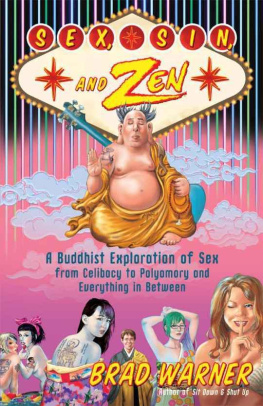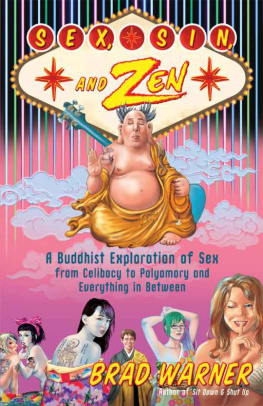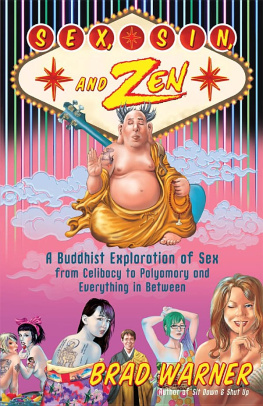Advance Praise for The Way of Tenderness
Zenju Earthlyn Manuel knows both the tyranny of conventional appearances and their ultimate nature. She knows that in order to tread the path to ultimate insight we must use the whole of our ordinary, conventional selves. In this way, our race, gender, and sexuality become sites for our awakening rather than illusions to be transcended. Read her lucid and honest words with attention and with tenderness.
Jan Willis, author of Dreaming Me: Black, Baptist, and Buddhist
Zenju Earthlyns book will spark the conversations on race, gender, and sexuality that will move Buddhism in the West to a place of accessibility and inclusivity. For anyone who wants to open their heart to others, this book holds the key.
Lodro Rinzler, author of Walk Like a Buddha
Zenju Earthlyn Manuel, one of only a small number of African American Buddhist priests, has written a transformative invitation, a breathtakingly courageous and heartfelt call to bring our full humanityour bodies, our pain, our wounds, our differencesto the path. Her way of tenderness is a way of acknowledging and healing the hatred in our own hearts and in the world. I am filled with gratitude for Zenjus embodied and compassionate revisioning of Buddhist teachings. This is a groundbreaking book, the beginning of a whole new conversation in the Dharma.
Zenshin Florence Caplow, coauthor of The Hidden Lamp
This is such an unusual book! Yes, its a Buddhist book, and yes, its about race, sexuality, and gender as crucial entry-points into the teaching (rather than false identities to be sloughed off). But its not what you think. Zenju Earthlyn Manuel writes with such gentle poetic intelligence that the readers experience of the truth she tells feels more like a caress than a jab. Of her own difficult experiences, Earthlyn has forged wise and profound equanimitya Way of Tenderness.
Zoketsu Norman Fischer, author of Training in Compassion
Reverend Zenju illuminates many aspects of the First Noble Truth that are invisible to and occluded by the dominant culture of Western Dharma. She does so with force of Truthfulness and the tenderness of Grace. In this way, the offering of her teachings are both the Path and the Fruit.
Larry Yang, core teacher at the East Bay Meditation Center
With an authentic and powerful voice, Rev. Manuel offers a unique and fresh perspective on timeless Buddhist truths.
M. LaVora Perry, author of Taneesha Never Disparaging

Wisdom Publications
199 Elm Street
Somerville, MA 02144 USA
www.wisdompubs.org
2015 Earthlyn M. Manuel
All rights reserved.
Parts of this book first appeared in Tell Me Something About Buddhism: Questions and Answers for the Curious Beginner, Zenju Earthlyn Manuel, Hampton Roads Publishing, 2011.
No part of this book may be reproduced in any form or by any means, electronic or mechanical, including photography, recording, or by any information storage and retrieval system or technologies now known or later developed, without permission in writing from the publisher.
Library of Congress Cataloging-in-Publication Data
Manuel, Zenju Earthlyn, author.
The way of tenderness : awakening through race, sexuality, and gender / Zenju Earthlyn Manuel.
pages cm
ISBN 1-61429-125-X (pbk. : alk. paper) ISBN 978-1-61429-149-7 (Ebook)
1. Buddhism-Social aspects. 2. RaceReligious aspectsBuddhism. 3. SexReligious aspectsBuddhism. 4. Sex roleReligious aspectsBuddhism. I. Title.
BQ4570.S6M45 2015
294.337dc23
2014020585
ISBN 9781614291251 ebook ISBN 9781614291497
19 18 17 16 15
5 4 3 2 1
Author photo by Simbwala Schultz. Cover Raku scultpure by Anita Feng.
Interior design by Gopa&Ted2, Inc.
In becoming forcibly and essentially aware of my mortality, and of what I wished and wanted for my life, however short it might be, priorities and omissions became strongly etched in a merciless light, and what I most regretted were my silences.
Of what had I ever been afraid?
Audre Lorde

If race, sexuality, and gender are illusions or social constructs, then what is the tension and ultimate hatred that arises with regard to them?
Table of Contents
BY DR. CHARLES JOHNSON
Ordinary life and Buddhahood have no distinction.
Great knowledge is not different from ignorance.
Why should one seek outwardly for a treasure,
when the field of the body has its own bright jewel?
Pao-chih, The Nonduality of Buddhahood and Ordinary Life
E arly in this thought-provoking book, Zenju Earthlyn Manuel informs her readers that The way of tenderness is not Buddhist, not a religion, not behavior modification, not a philosophy of life, or a conceptual view of life. It is not a static path. You will not comprehend this way without laying bare your human conditioning. You will not comprehend it by intellect alone.
Although she is an ordained Zen priest, and author of the splendid book Tell Me Something About Buddhism: Questions and Answers for the Curious Beginner, Manuel does not identify her meditation on race, sexuality, and gender as Buddhist. Yet the Dharma (teachings) is present throughout her work. Shakyamuni Buddha was not a Buddhist. I have read that he simply referred to his disciples as dhammiko (followers of dharma). The Dharma is just wisdom. It can be found anywhere and everywhere. No religion or philosophy, Eastern or Western, has a monopoly on wisdom.
As a dhammiko, Manuel is rightly annoyed by the avoidance of this issue in our sanghas, our spiritual communities:
Even though it has been said that we can awaken right where we are, in the very bodies we inhabit, on this planet upon which we walk, we still speak of awakening as if it happens somewhere outside of our particular embodiment in time and space. The silence regarding race, sexuality, and gender in spiritual literature may create the illusion that all is well in our spiritual communities, or that speaking of our unique embodiment in terms of race, sexuality, and gender is not necessary. When the subject is tabled for discussion in spiritual communities, the tension is palpable, and our inability to approach it honestly gives rise to frustration, grief, humiliation, guilt, numbness, blindness, fear, and rage.
Buddhism teaches the impermanence of all objects in our ordinary experience. That includes the body. Unlike most writers on spiritual subjects, Manuel phenomenologically grounds her meditation there, for the dark body in which [she] walks is aging in a youth-oriented society. That body, our impermanent and aging flesh, is the third term between consciousness and the world, mediating all of our perceptual experience. It is the costume that tabernacles consciousness, the temporary clothing that allows others to sometimes enslave us with their eyes. For this reason Manuel refuses to acquiesce to the polite, often well-meaning tendency in American sanghas and convert-Buddhist communities to pretend that physical differences do not matter and are not worthy of discussion. On spiritual paths, we are told, We are not our bodies. This is correct from the standpoint of absolute truth (paramrtha-satya). But it is not true for our daily, lived-experience on the plane of relative or conventional truth (samvtti-satya) in a diverse, multi-racial society where so many suffer from the three poisons of desire (or greed), ignorance, and hatred. Therefore, Manuel is compelled to ask, If the categories of race, sexuality, gender are illusions or social constructs then what is the tension and ultimate hatred that arises? How are these things both present and absent? What relationship does race, sexuality, and gender have with spirit? How can we be both tender and liberated? What chases some away from this topic and draws others towards it?
Next page
